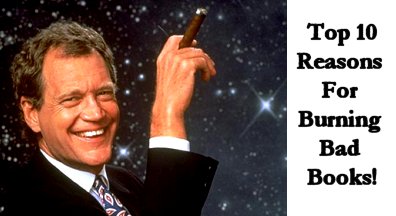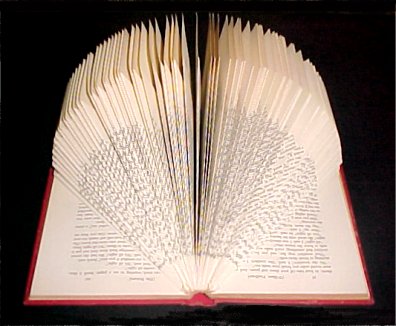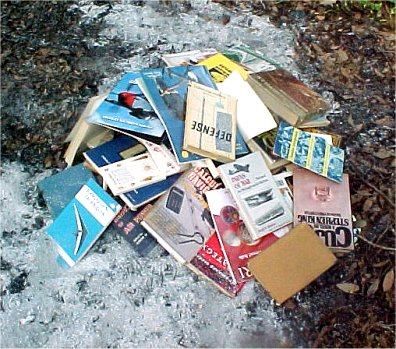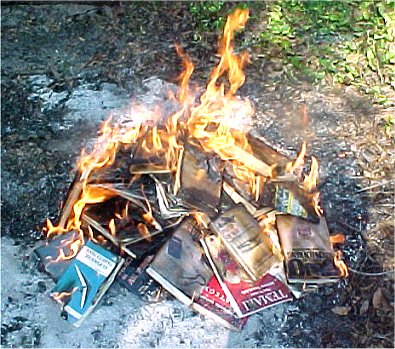

|

10. Burners perceived as magnanimous for reducing supply of bad books in marketplace. 9. Remaining copies of bad books rendered less common - hence more saleable. 8. Time spent by booksellers shelf scanning in thrift stores dramatically reduced - and, yes, cell phone connection fees drop like a stone! 7. Logging pressure on forests reduced via conversion of fire pits to alternative fuel sources. 6. Valuable shelf space freed up in booksellers' storage areas for your arriving copies of banned books (see this week's Gold Edition). 5. Less time wasted selling books nobody wants. 4. Number of perfectly good steaks transmogrified into gray, steaming Naugahyde plunges. 3. Mug shots of Lee Iacocca, Oprah, Rush Limbaugh, Larry King and Dr. Laura Schlessinger expunged - mercifully and finally - from the North American landscape. 2. Special, elusive "light" feeling, heretofore known only to accomplished practitioners of levitation, now commonplace in bookselling profession. And the number one reason for burning bad books: 1. Finally, a chance to get really good at making book fans.

Book fans, in case you don't know, are one of the most environmentally friendly methods of starting a book fire. Make up a half dozen or so of your favorite designs, light them, and watch the blaze quickly develop. As it does, add un-fanned, preferably pulpy paperbacks to it until a bed of intense coals develops. At this point less ignitable books can be added, later those with coated paper, and last but not least, coffee-table books. The latter will ignite almost instantly over a super-heated fire, and talk about space saving! For those not artistically inclined, dousing a pile of books in diesel fuel is a safe method for starting a book fire, but I don't advise it unless you live in a rural area. Otherwise, your neighbors will think you're converting your back yard into a bus terminal. (Do not under any circumstances use gasoline.) Charcoal lighter fluid is the best choice, and if this evokes thoughts of sizzling, glistening New York strips, yes, there's absolutely no reason why you can't multitask - cook a delicious dinner while you're skimming the slag from the fining pot of your inventory. For special symbolic significance, consider assembling a topical fire consisting entirely of - I'm guessing this almost goes without saying - microwave cookbooks.


Before burning, check the laws and regulations for your area, make sure you know how to control and
extinguish fires using the fuel you've chosen, and review outdoor fire safety practices.
For more information on fire safety, these are among the many helpful sites-
Outdoor Fire Safety - US Dept. of Agriculture,
Deschutes County Rural Fire Protection District #2,
Safe Debris Burning - Washington State Dept. of Natural Resources, and
SmokeyBear.com
Questions or comments?
| Forum
| Store
| Publications
| BookLinks
| BookSearch
| BookTopics
| Archives
| Advertise
| AboutUs
| ContactUs
| Search Site
| Site Map
| Google Site Map
Store - Specials
| BookHunt
| BookShelf
| Gold Edition & BookThink's Quarterly Market Report
| DomainsForSale
| BookThinker newsletter - free
Copyright 2003-2011 by BookThink LLC
|

|